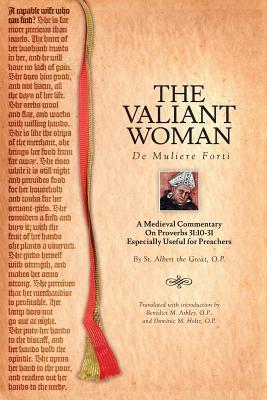

The Valiant Woman: A Medieval Commentary on Proverbs 31:10-31
Albertus Magnus, Benedict M. Ashley, Dominic M. Holtz
3(1 readers)
This splendid example of medieval scriptural interpretation shows us how the “spiritual sense” of scripture enriched the minds of the faithful and warmed their hearts. The literal and historical sense of the passage in Proverbs 31,which is known as the Valiant Woman, is a eulogy for a faithful Jewish wife and mother, who stands out above others for her strength. The spiritual sense, using analogy, meticulous divisions, and proof texts from scripture, finds in this acrostic poem, a catalyst for exploring the deepest mysteries of redemption, the mystical union of the risen Christ, the Husband, with his faithful Church his Bride, seen as the Valiant Woman. By extension, it is also the faithful soul, imitating the Church, experiencing the adventure of seeking the beloved and eternal happiness. St. Albert the Great puts his imagination to service in the understanding of every Christian’s spiritual quest. Every verse, every chapter, opens a new vision of the Valiant Woman. Why the Church should be understood as a woman(ch. 1); how her Husband trusts in her(2); how they repay each other (3); symbols of wool and flax, and the work of her hands (4); she is a ship (5); nights and banquets (6); olives, fields, and vineyards (7); her arm and her strength (8); taste and sight, her lamp (9); wrestling with vices, her fingers (10); stretching out to the poor (11); her house in snow, her servants doubly clothed (12); her tapestry of the passion (13); Christ and the gates of Jerusalem (14); linen garments (15); her strength, fortitude and laughter (16); her “mouth” and “tongue” (17); her house (18); blessed like the sons of Jacob (19); her “riches” (20); how praised (21); fruits of the spirit, in the gates (22).Sometimes amusing, always amazing, and profound in its spiritual wisdom, “The Valiant Woman” is a fruitful experience for the reader and a welcome addition to the translations of medieval scriptural commentaries.
Publisher
New Priory Press
Publication Date
4/13/2013
ISBN
9781623110109
Pages
386
Categories
About the Author

Albertus Magnus
born in perhaps 1206
German religious philosopher Saint Albertus Magnus, originally Albert, count von Bollstadt, and also noted as the teacher of Saint Thomas Aquinas, sought to apply methods of Aristotle to current scientific questions.
Also known as Albert the Great and Albert of Cologne, this member of the Catholic order of preachers (Dominicans) served as friar and from 1260 to 1262 as bishop of Regensburg. During his lifetime, people knew him as doctor universalis and doctor expertus and later appended the term magnus ("the great") to his name. Scholars, such as James Athanasius Weisheipl and Joachim Roland Söder, referred to this greatest theologian of the Middle Ages. The Church honors him among its 35 doctors.
https://en.wikipedia.org/wiki/Albertu...
German religious philosopher Saint Albertus Magnus, originally Albert, count von Bollstadt, and also noted as the teacher of Saint Thomas Aquinas, sought to apply methods of Aristotle to current scientific questions.
Also known as Albert the Great and Albert of Cologne, this member of the Catholic order of preachers (Dominicans) served as friar and from 1260 to 1262 as bishop of Regensburg. During his lifetime, people knew him as doctor universalis and doctor expertus and later appended the term magnus ("the great") to his name. Scholars, such as James Athanasius Weisheipl and Joachim Roland Söder, referred to this greatest theologian of the Middle Ages. The Church honors him among its 35 doctors.
https://en.wikipedia.org/wiki/Albertu...
Questions & Answers
Reader Reviews
Loading comments...